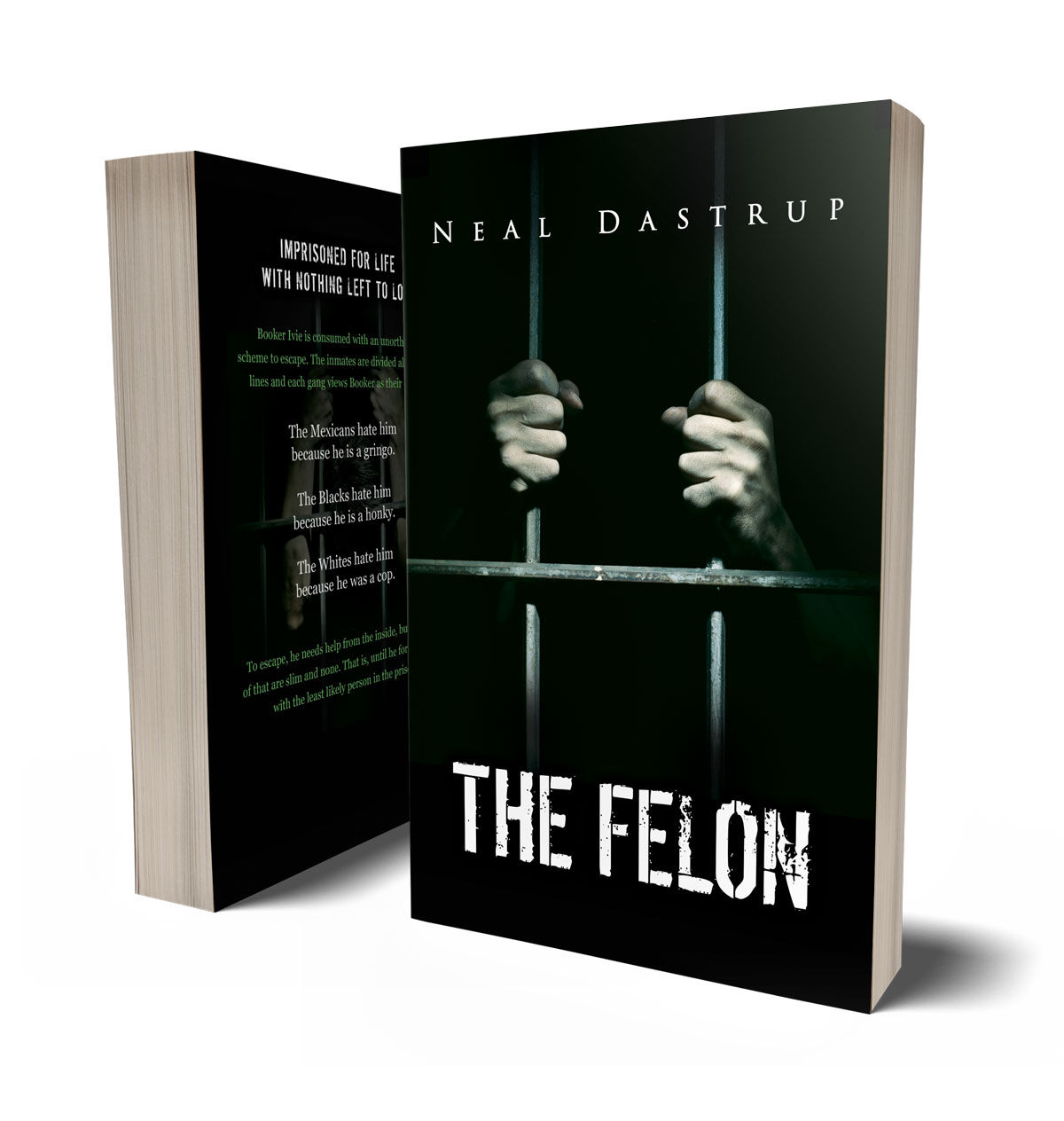PART 1
ONE
SOLITARY
DRAPER, UTAH — POINT OF THE MOUNTAIN, DECEMBER 1971
Booker Ivie shuffled slowly down the cellblock walkway. Rows of inmates with tattooed arms hanging through the bars of their cells whistled and jeered at him. Their catcalls had the effect of stabbing a pick through his chest.
“New meat!” was screamed more than once and the vulgarity of the taunts increased as he limped toward what would become his personal cell. His wrists were cuffed together with a heavy chain linking them to leg irons around his ankles. The soreness of the shackles rubbing against his skin was agonizing, but his trustee escort showed no sympathy.
“I’ll bust out of this hole,” he rasped to the trustee between curses.
In a heavy Mexican laced accent, the short, overweight escort snarled “Cállate, gringo. No speak on cellblock.”
Booker did as he was told and continued his slow shuffle. However, the incessant taunts from unseen faces behind bars drove him deeper into a state of depression and dread. Ten days in solitary confinement might seem like a lifetime. He would soon find out.
When he and the trustee reached his cell, the dreariness of the place overwhelmed him. Six feet wide. Eight feet deep. Seven feet high. The small box allowed little room for anything, especially when a six foot three, two hundred thirty pound man gets stuffed inside.
In the cell was a cot with a thin mattress, an empty shelf and a one-piece sink-toilet constructed of welded stainless steel. “A crapper without a lid,” Booker thought. Then he touched the cold wall and glanced around. He was surrounded by concrete, with the exception of the door, which was made of one-inch thick bars inside a solid steel frame. There was a slot in the middle of the door, chest level, that was designed to allow a plate of food to slide through. The space between the heavy bars provided light inside the compact dungeon.
Booker sat on the cot in a trance. He was a forsaken soul inside the dingy room and his emotions ranged from hopelessness to desperation and then to thoughts of suicide. The felon mumbled to himself after the steel door clanged shut and the locking mechanism engaged. He searched deeply for a thread of sanity.
“How can I escape?” he thought. “There has to be a way out.”
After his mind flat-lined, the convict rotated his feet to the end of the cot and laid down on his back. When he was horizontal, he closed his eyes and considered the circumstances that had landed him in prison. It was a horror movie that played over and over in his head.
Throughout the rush of memories, he cursed the day he began working for the sheriff of San Juan County. In repeated scenes, he recollected crime after crime committed behind his deputy badge. Now, those despicable misdeeds had resulted in his being caged in a tomb not much larger than a downtown parking space.
Booker could have been assigned to a regular cell in the general prison population, but because of his belligerence while in transit from the county jail to the prison, the warden reassigned him to solitary confinement. He was told he might be transferred out of solitary in ten days if his attitude improved.
In addition to the cot, mattress and toilet, there was one other item inside the cell: a King James Bible. Booker scoffed at the offering and initially used the book for a pillow. However, since there was nothing to read, he eventually thumbed through the well-worn pages. When he came across a folded down corner, he stared for a time at a verse that was underlined. The message caused him to reread the words. The scripture was the thirty–third verse of the sixty–ninth chapter of Psalms: “For the LORD heareth the poor, and despiseth not his prisoners.”
Booker considered these words and slowly repeated them aloud. After pondering, he mumbled to himself, “So God doesn’t despise me? I doubt it.”
When evening came and it was too dark to read, he stared blankly at the ceiling until his eyelids were heavy. Initially, he felt better than he had on any of the nights he spent in the hospital receiving treatment for his wounds. For a brief time, his fears subsided and in their place were memories of his high school football days. Just five years ago, he and his best friend, Jasper Black, were the highly touted strength of the Broncos. They played right and left tackle, both on offense and defense. No opponent ever ran plays through them. None were that stupid. Booker thought fondly of those glory days when smash mouth football brought him fame and glory and every cheerleader in the school wanted to date him.
He and Jasper were big boys, but not in a fat, sloppy way. They were massive, well-conditioned athletes and both loved to hit. Their senior year, the Broncos made it to the playoffs, but lost in the semi-final game to their rivals from nearby Moab. To this day, it was argued they would have won that match-up, had not Booker and Jasper been kicked off the team and expelled from school the day before the game.
The two had busted out the front window of the local grocery store and made off with a truckload of beer. As if that was not enough, they showed up at school drunk the next morning, the day before the big game. Both were promptly arrested and hauled off to jail while their peers stared in disbelief.
Without their all-state linemen, the Broncos were steamrollered by Moab’s quarterback. He kept the ball himself on
“most plays and ran play after play off tackle, single handedly running up the score to notch the win. Two Moab players went on to star for the University of Colorado, while Booker and Jasper went to jail to serve time for their misdeeds.
The captive sat up with a start. “Stupid!” he exclaimed aloud. “That stupid beer binge changed our lives. Scholarships were rescinded and we had nowhere to go. If the sheriff hadn’t sprung us out of juvenile detention and put us to work, we’d have really been screwed.”
After proving themselves, Sheriff Blankenship gave them a permanent job with a title. He called them “deputy-trainees.” From that point on, he led the oversized teenagers into a life of crime with one ill-advised scheme after another.
When he stretched out on the cot again, Booker found it difficult to go to sleep. Instead, he tossed and turned while his mind raced wildly. Why hadn’t he stayed sober, gone to college and pursued the goals he and his mother had set? He could have made a life for himself. He might even have a family of his own by now.
While contemplating what could have been the evening dampness in his cell gave him a chill. The thin, worn out blanket was the only covering on the steel bedstead and it was not enough to keep him warm. He rubbed his arms and legs to improve his circulation, but even that did not help. Falling deeper into despair, he buried his face in the dirty, stained mattress and started to weep.
TWO
THE MORNING MEAL
An inmate’s day begins with a wake-up call from the Duty Officer and takes place during the personnel change between night and day shift. At the Utah State Prison, reveille sounds at six a.m., then a roll call lineup follows to ensure all inmates are accounted for. Following lineup, the prisoners change into their day clothes and proceed single file to breakfast. During their march through the cellblocks, no conversation is allowed. Prisoners in solitary confinement, however, are not allowed to join the procession to the mess hall. They eat in their cell.
A convict with trustee status is assigned to deliver food to the dozen or so prisoners in solitary. At seven a.m., the trustee begins his rounds. Even though Booker did not occupy the end cell on the block, the trustee intentionally served him last. When he reached the ex-cop’s cell, José Rodrìguez carefully slid the tin plate into the slot between the bars. When Booker reached for it, the trustee pushed the plate hard through the opening, causing the contents to splatter on the prisoner and fall to the floor.
“Leek eet off thee cement, asesino!,” José sneered. “Mi muchachos wait for you to get out of the hole. Raul watch for you and he weel find you. He wait in thee shadows. Cuz you keel Mexicans, Raul keel you. Watch you back, gringo.”
Booker staggered backward to the wall opposite the door. Everything seemed darker there than in front. His fear increased moment by moment and his heart beat faster and harder. Finally, he heard the outer cellblock door slam shut. Because of Rodrìguez’s threat, he was not sure if he wanted to leave solitary after all.
Who was Raul? And how many muchachos could there be? He was certain a few Mexicans from San Juan County were in the lock up because he had transported them himself.
Booker sweated profusely and felt dizzy and light headed. Then he thought about the horde of Mexicans who had lined the entrance to the prison when he arrived. They were yelling epithets in Spanish and waving signs calling for his death. He could feel the intensity of their hatred from inside the transport van. How many of these Latinos had family or friends locked up on the inside? His head felt like it would explode from the sudden emergence of a deep headache.
“I’m gonna die in this hole,” he mumbled under his breath. Then, he screamed it out loud: “I’m gonna die in this hole!”
As time passed, Booker’s day did not improve. His mind continued to race wildly until his throat filled with bile. Then his stomach rolled and he began to cramp. He knew he was about to throw up the small amount of breakfast he had managed to scrape off the floor, so he rushed to the toilet, stuck his head inside the bowl and gagged violently. One retch followed another until he had regurgitated everything, as well as chunks of acidic liquid.
When he stumbled back and fell on his cot, his face was flush and his eyes were filled with water. He was physically and emotionally spent and he hugged the mattress, tossing and turning in fear. He had nothing to look forward to except lunch, and he was not looking forward to lunch at all.
After an hour of anguish, Booker forced himself off the bed and began to exercise. He did push-ups, sit-ups and isometrics. Then he stood on his head to get blood flowing to his brain. He tried every form of physical activity he could imagine until he was exhausted. Then he retired to his mattress to rest.
With nothing to occupy his mind, Booker again picked up the Bible. This time, it fell open to the Book of Revelation. Someone from the past had marked the tenth verse of the second chapter: “Fear none of those things which thou shalt suffer: behold, the devil shall cast [some] of you into prison, that ye may be tried; and ye shall have tribulation ten days: be thou faithful unto death, and I will give thee a crown of life.”
“Ten days,” he thought. “If the warden makes me, I can last ten days in here. But I’m worried I’ll end up getting my crown of life from Raul.”
Author’s note:
The first U.S. experiment in solitary confinement was in 1829 at the Eastern State Penitentiary in Philadelphia. The concept was based on a Quaker belief that prisoners isolated in stone cells with only a Bible would use the time to repent, pray and find introspection. Initially, Booker neither repented nor prayed, but the Quakers were right about introspection. As he thumbed through the pages, he found passages that gave him hope.






